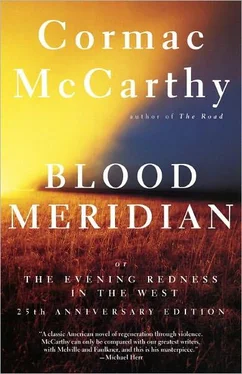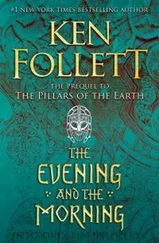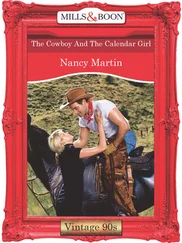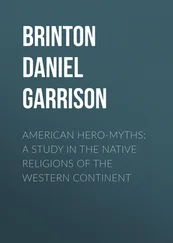The howitzer – The Yumas attack – A skirmish – Glanton appropriates the ferry – The hanged Judas – The coffers – A deputation for the coast – San Diego – Arranging for supplies – Brown at the farrier’s – A dispute – Webster and Toadvine freed – The ocean – An altercation – A man burned alive – Brown in durance vile – Tales of treasure – An escape – A murder in the mountains – Glanton leaves Yuma – The alcalde hanged – Hostages – Returns to Yuma – Doctor and judge, nigger and fool – Dawn on the river – Carts without wheels – Murder of Jackson – The Yuma massacre.
The doctor had been bound for California when the ferry fell into his hands for the most by chance. In the ensuing months he’d amassed a considerable wealth in gold and silver and jewelry. He and the two men who worked for him had taken up residence on the west bank of the river overlooking the ferrylanding among the abutments of an unfinished hillside fortification made from mud and rock. In addition to the pair of freightwagons he’d inherited from Major Graham’s command he had also a mountain howitzer—a bronze twelvepounder with a bore the size of a saucer—and this piece stood idle and unloaded in its wooden truck. In the doctor’s crude quarters he and Glanton and the judge together with Brown and Irving sat drinking tea and Glanton sketched for the doctor a few of their indian adventures and advised him strongly to secure his position. The doctor demurred. He claimed to get along well with the Yumas. Glanton told him to his face that any man who trusted an indian was a fool. The doctor colored but he held his tongue. The judge intervened. He asked the doctor did he consider the pilgrims huddled on the far shore to be under his protection. The doctor said that he did so consider them. The judge spoke reasonably and with concern and when Glanton and his detail returned down the hill to cross to their camp they had the doctor’s permission to fortify the hill and charge the howitzer and to this end they set about running the last of their lead until they had close on to a hatful of rifleballs.
They loaded the howitzer that evening with something like a pound of powder and the entire cast of shot and they trundled the piece to a place of advantage overlooking the river and the landing below.
Two days later the Yumas attacked the crossing. The scows were on the west bank of the river discharging cargo as arranged and the travelers stood by to claim their goods. The savages came both mounted and afoot out of the willows with no warning and swarmed across the open ground toward the ferry. On the hill above them Brown and Long Webster swung the howitzer and steadied it and Brown crammed his lighted cigar into the touch-hole.
Even over that open terrain the concussion was immense. The howitzer in its truck leaped from the ground and clattered smoking backward across the packed clay. On the floodplain below the fort a terrible destruction had passed and upward of a dozen of the Yumas lay dead or writhing in the sand. A great howl went up among them and Glanton and his riders defiled out of the wooded littoral upriver and rode upon them and they cried out in rage at their betrayal. Their horses began to mill and they pulled them about and loosed arrows at the approaching dragoons and were shot down in volleys of pistolfire and the debarkees at the crossing scrabbled up their arms from among the dunnage and knelt and set up a fire from that quarter while the women and children lay prone among the trunks and freightboxes. The horses of the Yumas reared and screamed and churned about in the loose sand with their hoopshaped nostrils and whited eyes and the survivors made for the willows from which they’d emerged leaving on the field the wounded and the dying and the dead. Glanton and his men did not pursue them. They dismounted and walked methodically among the fallen dispatching them man and horse alike each with a pistolball through the brain while the ferry travelers watched and then they took the scalps.
The doctor stood on the low parapet of the works in silence and watched the bodies dragged down the landing and booted and shoved into the river. He turned and looked at Brown and Webster. They’d hauled the howitzer back to its position and Brown sat easily on the warm barrel smoking his cigar and watching the activity below. The doctor turned and walked back to his quarters.
Nor did he appear the following day. Glanton took charge of the operation of the ferry. People who had been waiting three days to cross at a dollar a head were now told that the fare was four dollars. And even this tariff was in effect for no more than a few days. Soon they were operating a sort of procrustean ferry where the fares were tailored to accommodate the purses of the travelers. Ultimately all pretense was dropped and the immigrants were robbed outright. Travelers were beaten and their arms and goods appropriated and they were sent destitute and beggared into the desert. The doctor came down to remonstrate with them and was paid his share of the revenues and sent back. Horses were taken and women violated and bodies began to drift past the Yuma camp downriver. As these outrages multiplied the doctor barricaded himself in his quarters and was seen no more.
In the following month a company from Kentucky under General Patterson arrived and disdaining to bargain with Glanton constructed a ferry downriver and crossed and moved on. This ferry was taken over by the Yumas and operated for them by a man named Callaghan, but within days it was burned and Callaghan’s headless body floated anonymously downriver, a vulture standing between the shoulderblades in clerical black, silent rider to the sea.
Easter in that year fell on the last day of March and at dawn on that day the kid together with Toadvine and a boy named Billy Carr crossed the river to cut willow poles at a place where they grew upstream from the encampment of immigrants. Passing through this place before it was yet good light they encountered a party of Sonorans up and about and they saw hanging from a scaffold a poor Judas fashioned from straw and old rags who wore on his canvas face a painted scowl that reflected in the hand that had executed it no more than a child’s conception of the man and his crime. The Sonorans had been up since midnight drinking and they had lit a bonfire on the bench of loam where the gibbet stood and as the Americans passed along the edge of their camp they called out to them in Spanish. Someone had brought a long cane from the fire tipped with lighted tow and the Judas was being set afire. Its raggedy clothes were packed with squibs and rockets and as the fire took hold it began to blow apart piece by piece in a shower of burning rags and straw. Until at last a bomb in its breeches went off and blew the thing to pieces in a stink of soot and sulphur and the men cheered and small boys threw a few last stones at the blackened remnants dangling from the noose. The kid was the last to pass through the clearing and the Sonorans called out to him and offered him wine from a goatskin but he shrugged up his rag of a coat about his shoulders and hurried on.
By now Glanton had enslaved a number of Sonorans and he kept crews of them working at the fortification of the hill. There were also detained in their camp a dozen or more indian and Mexican girls, some little more than children. Glanton supervised with some interest the raising of the walls about him but otherwise left his men to pursue the business at the crossing with a terrible latitude. He seemed to take little account of the wealth they were amassing although daily he’d open the brass lock with which the wood and leather trunk in his quarters was secured and raise the lid and empty whole sacks of valuables into it, the trunk already holding thousands of dollars in gold and silver coins as well as jewelry, watches, pistols, raw gold in little leather stives, silver in bars, knives, silverware, plate, teeth.
Читать дальше












